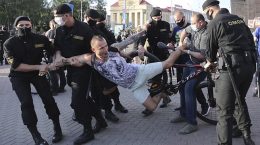Challenges of civil society and ways to address them?
One of the set objectives in the activity of the International Center for Civil Initiatives – “Our House” is to fill the gaps and lacunae in the work of other public organizations. We do not make competition and do not aim to criticize or discredit other public organizations, as we understand that all of us is working under difficult circumstances and everyone tries to fulfill their job as best as our capacity allows. What we want to do is to help other organizations to fill the gaps that they for some reason have not discovered yet, and also to think together about successful strategies to change the present situation. We also believe that the first step to solving a particular problem is to fix it and call it a problem.
This report will deal with electoral commissions that ensure the work of the entire so-called electoral system of Belarus. In particular, we would like to draw attention to some of the nuances of the work of the electoral commissions of Belarus, as well as to start a discussion on what can be done under the existing context in Belarus today. Local elections were completed in Belarus on 18 February 2018. 18 110 deputies were elected to local councils in Belarus up-to-date. A total of 7 540 commissions were involved in these elections and 78 427 people (58 172 women) were working in these elections.
Whereas:
• there were 1 309 territorial commissions and 10 507 people (8 798 women) were staffed
• there were 361 district commissions and territorial commissions by the area of the city of Minsk, 4 104 people (3 058 women) were staffed.
• there were 5 870 precinct commissions, 63 816 people (46 316 women) were staffed.
The facts about the electoral commissions that surprised us:
1. 24% of the present deputies in local councils were members of electoral commissions for the presidential elections in 2015 and for the parliamentary elections in 2016. In our opinion, this means that
a) the deputies were checked by the authorities for loyalty and to some extent they deliberately “covered them up” (discredited) by participation in falsifications, that is, it was a kind of a test of “loyalty” to the system, a mutual guarantee. That is, a man involved in dark and ugly things will be more cooperative in local councils, being more submissive. Thus, the government is doing its best to prevent possible “riots” of local councils;
b) the Belarusian authorities start having problems of scarce human resources, there are not enough people. As far as we know, the deputies did not participate in the electoral commissions so massively before. This is a new trend. Moreover, if we compare it with the local elections in 2014, then, in fact, the state has decreased the number of people involved in the work of electoral commissions: in 2014, 82 069 people have participated in the work of electoral commissions (3 642 people more than in 2018). That is, in fact, in 2018, the authorities could fully include all those willing to become members of electoral commissions, as there were enough places for everyone.
2. Approximately 57% of all members of electoral commissions are the same people. Nevertheless, it is strange but true: during the period of 24 years, no public organization has collected the names of these people and found out who these people are and why they are doing it, what is their motivation. This is not such a large group of people – about 50–55 thousand people, it makes sense to work with them in a pointwise manner and look for the ways to approach them, for example, peaceful and benevolent ways of persuasion. There are nowhere any consolidated lists of members of electoral commissions for the previous years. Moreover, the authorities begin to “clean up traces”, i.e. those copies of newspapers that contain the lists of members of electoral commissions for the previous years are being destroyed at the libraries where they are stored.
3. In addition, elections among public organizations and political parties that were engaged in observation do not have so many documents proving electoral fraud. This is due to several factors:
A) constant searches and, as a consequence, seizures of documents by KGB officers or other security agencies, and, as a rule, people do not make electronic copies.
B) the observation is carried out by specialized organizations and does not involve a large number of people. In fact, in Belarus, there is a pointwise observation, and it is impossible to fix mass falsifications by the forces that are present, and much less, it is impossible to identify all falsifiers.
C) moreover, often public organizations and political parties are in strange illusions that they have documents, but then it turns out that either they do not exist at all or they are in such disorder that we can consider that they are essentially nonexistent. Therefore, if the organization states that it has documents but they are not available publicly, we would be skeptical about these statements. A similar situation already happened in 2010 with the idea of a “blacklist of banned officials who are involved in repression against civil society”: quite a lot of organizations claimed that they have lists of officials involved in repression, and then it turned out that there are no such lists. As a result, there was a big mess with the list of “officials banned from traveling to Europe and involved in repression”: some of the people were in the list accidentally and they were not involved in repression, and those who were involved in the repression were not included in this list. Therefore, it is necessary to collect all the documents that exist and make them public. However, it is needed to be prepared for a worse situation, when it will not be possible to prove that specific people were involved in falsifications since there are no documents proving this.
4. In Belarus, electoral frauds are literally made by women. The total number of women in the electoral commissions of Belarus makes 74%, i.e. overwhelming majority. Moreover, since the Alexander Lukashenko’s accession to power, his traditional electorate consists precisely of women: according to the public opinion polls of the IISEPS, 64% of all those who voted for Lukashenko in 2010 was women. It is strange but true: apart from “Our House”, there are practically no broad campaigns aimed at female voters as a social group. However, women are a “tasty” target group for any political and civil structure, but none of the civil society is fighting for their voices (including the votes and opinions of female members of electoral commissions).
5. It is strange but true: during 24 years of Alexander Lukashenko’s rule, not a single nationwide information campaign was conducted in Belarus dedicated to the cases of electoral fraud, the ways of falsifications and modes of responsibilities. Therefore, according to the latest poll of IISEPS, only 9.2% of Belarusians think that elections are falsified, and 52.1% believe that there are fair elections in Belarus. The rest either could not decide what to answer (13.5%) or they suspect something, but they are not sure about falsifications (25.2%).
6. Fewer and fewer people are participating in socio-political processes at the local level. A total of 82 338 people were put forward to the commissions, 78 427 people were working in the commissions. That is, all independent political parties and public associations participating in the elections were able to nominate to the commission only 3 937 people (this is approximately 5% of the total number of people nominated as members of electoral commissions). For comparison: in 2014, the opposition nominated 10 863 people to the electoral commissions (this is 3.6 times more than in 2018). A serious problem has arisen: the number of people actively participating in political processes is drastically falling, and with such a dynamics of fall in the activity of citizens, by 2019-2020, there will be literally nobody to nominate from the civil society to electoral commissions. The same situation is going on with the monitoring of the elections. There were 458 observers from political parties. 304 people – from public associations, 104 of them were human rights defenders. This number of independent observers is not enough for the wide monitoring of the work of 7 540 commissions. Let me remind you that the most massive monitoring in the history of Belarus was conducted in the 2001 presidential elections: out of total number only 717 people were international observers from 45 countries (at that time the OSCE mission was headed by the German diplomat Hans-Georg Wieck), and 21 887 people were domestic observers of the elections. The umbrella organization of the NGO “Civil Initiative – Independent Monitoring” mobilized more than 10 thousand observers. It is strange but true: since 2001, no independent monitoring campaign has been able to break this record.
Electoral fraud in Belarus can be suspended through a systematic approach
(3 steps to suspend fraud):
-
Pointwise approach – almost personal work with members of electoral commissions. It is necessary to collect the names of all members of electoral commissions, to study their background and motivation to participate in electoral fraud. In addition, it is necessary to collect all available documents related to the cases of fraud (there will be few of them). The target group that we are interested in is the permanent members of electoral commissions and all election campaigns, i.e. this is approximately 50-55 thousand people. Most of them are either public servants (officials) or employees of the state organizations, and therefore they are subject to the laws on “Citizens’ appeals”, “Regulations on the Book of Comments and Suggestions”, etc. We need to meet with them, to establish a contact, to try to explain the importance of fair votes counting, etc.
-
A broad information campaign, including the establishment of clubs of local voters. First of all, the implementation of an information campaign is necessary to explain why elections are needed, what they are influencing, and why it is important to participate in them. Moreover, it is needed to conduct a maximum dissemination of information (with documents) about existing cases of falsifications and include there specific advice, fore example, how an ordinary person can influence the results of elections and what he/she needs to do, especially in case of a threat of job loss, etc. Actually, this part of the information campaign should be aimed at two tasks: a) the education of a responsible voter; b) the education of a responsible observer, i.e. the maximum involvement of people in the future campaigns to monitor the elections.
-
Conduction of advocacy campaigns aimed at protecting the interests of women and involvement of women participation in the socio-political sphere, including targeting at women who are members of electoral commissions. They should recognize the attractiveness of legislation shift and changes in the socio-political sphere.
Conclusion:
1. The situation with the electoral commissions of Belarus requires detailed study. It is strange that the analysts did not study the electoral commissions of Belarus in a serious manner. The most of what is available are the reports of observers about the past elections, which were published on specialized websites with traditionally light traffic and in the independent press, but were getting lost among the news stream.
2. During 24 years, none of the three systemic steps has been taken (there were fragile attempts), and it is possible to reach success only when all of the three steps are taken simultaneously.
3. A systematic approach and step-by-step implementation of the strategy will allow to significantly improve the situation with electoral fraud in Belarus quite quickly, within several years, and if the work is carried out by many organizations at once, then the electoral fraud will be suspended.
![]()








